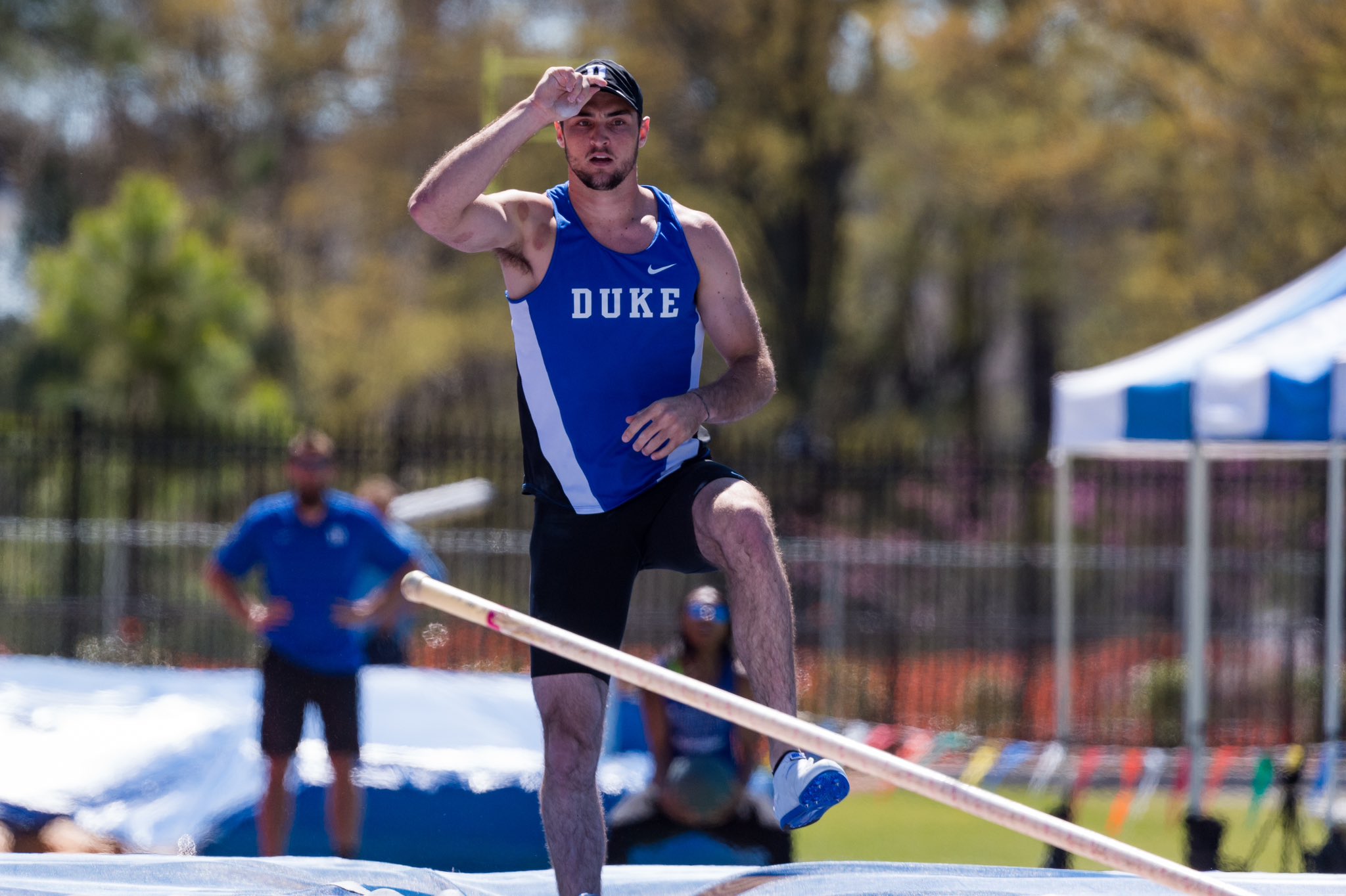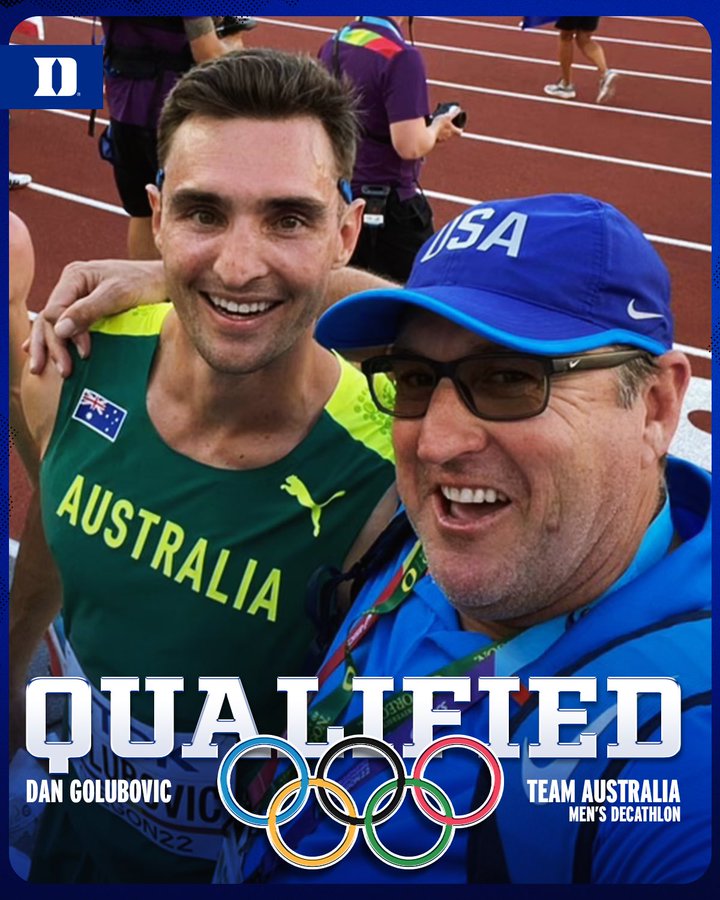Former Duke track and field athlete Daniel Golubovic M.B.A.’17 will make his Olympic debut at the 2024 games, which begin Friday, July 26, in Paris. The decathlete, who will be competing for Australia, says the games will be the culmination of a long journey and thousands of hours of hard work that he says have gotten him where he wants to be.
DukeMag spoke with Golubovic as he was making his final preparations for Paris.
DukeMag: What made you want to become a track athlete?
Daniel Golubovic: I played just about every sport growing up – soccer, baseball, basketball, at least all the usual stuff. … I started going toward action sports, skating BMX in high school, got a dirt bike, motocross, looking for a bit of an adrenaline kind of kick. My dad said the deal was that I had to stay in a team sport for school. So, the only thing that the school offered that I hadn't tried before was track and field and in my head, I was like, “I don't want to run. Like nobody wants to go out and just run, right?” My dad basically handed me to the coach at my high school and said, he's tall, he can run, put him where you need him, and he did. I started as a high jumper and I was very fortunate that my high jump coach also had a good relationship with the pole vault coach because again, with that adrenaline kick, right? I was like, “What's the craziest thing I can do here? Throw myself as high as I can go,” and my senior year, I started pole vaulting. I picked it up quickly. My coach recognized it, and he started experimenting with me. Try discus at this meet, try long jump at that meet, try the hurdles here, and it kind of grew behind the scenes because I didn't know what the decathlon was. He was testing me to gauge aptitude toward picking up new skills and things, and as the end of the year came around, he said, “I want you to try this. It's called the decathlon. It's a whole big challenge and I think you'll like it.” And I did and it was fantastic.
DM: Your hometown is Los Angeles. Talk about your upbring as a child in California.
DG: I was born in Torrance, California, in the suburbs of LA, and because my dad was Australian, he had applied for and got my dual citizenship when I was a little baby. But upbringing-wise, I was definitely in the states through all my schooling years and sporting knowledge kind of came from the states as well, even through NCAA in university.
DM: You went to UC San Diego for undergrad in economics and came to Duke’s Fuqua School of Business. What made you want to come to Duke?
DG: I cannot isolate one thing. One, blue is my favorite color, but Duke itself is like the pinnacle of sport. It's got such a presence. It's got so much gravitas behind it in just its legacy. Obviously, academics as well, but I think from everybody else's perspective, like the name travels just because everybody knows Duke basketball, the number of professionals that come out of the sporting system and that have success in the NCAA and beyond from Duke. So, Duke was always one of the ones, especially in high school, that was like on my radar. It was a dream. My grades were not good enough at the time coming out of high school. So, I didn't have the opportunity to attend Duke, my undergrad, and it showed. I needed a kick in the rear end to really get my academics in gear, which is what UC San Diego really provided me – taught me how to be a student, how to balance everything. And I worked my way into getting my getting my GPA up and graduating with honors, which I think is what led me to the Fuqua school. And Duke's track and field program, specifically, is one of the best in the country.
DM: Can you talk about your experience at Duke as a student athlete?

DG: I think it's one of those things that I knew was going to be a challenge going in. ... I had a very rough first year of sporting and academic history at my first university and I to be quite honest, I am thankful for it because that is what really prepped me to be able to handle everything that I've experienced later. ... And I think going into it with the understanding that there will be a balance, that neither will be necessarily perfect how I want it, and also being prepared for the rigors and almost over-expecting the challenges of it all, it really kind of helped me level out and find my rhythm.
DM: You are now a volunteer assistant track coach at Duke. Why was it important for you to come back to coach at your alma mater?
DG: I really do love sport. I think it provided me with certain benefits as well. Maintaining a volunteer coaching status allowed me to continue training and use some of Duke's facilities and still train with the Duke athletes and under my coach as well. It provided a great system to be able to kind of cultivate that really competitive ambiance in training that I think is so important to actually going out and competing with that competitive nature. ... And one of my favorite things is being able to kind of share what I've learned and my stories and some of the things that have helped guide this path.
DM: You won silver at the 2022 Commonwealth Games, which was your first medal in your professional career. How did you feel when you won?
DG: I will be honest; it was slightly bittersweet because I only just missed out on the gold. It was a really really tight one. It’s very similar to when I got my invitation to compete at the Olympics this year. It was this sense of joy and pride, a bit of satisfaction and just a bit of that, like reassurance and hunger because there's been years and years of work and dedication and sacrifice from me and everybody around me.
DM: You will be representing Australia in the decathlon event. What are you looking forward to most in Paris?
DG: I've been to two world championships now and I love going to these major events because I know the majority of the guys in the field at this stage. A lot of them are actually from my time at university and competing in the NCAA and it's always like a reunion in a sense.With the decathlon, especially, we're out there for two days competing probably, if it's a quick meet, 7 to 8 hours a day and there is a grueling aspect to it where it is brutal. So, the sense of camaraderie between athletes from different countries and competitors is something that I don't think is really found in a lot of other sports, especially other events in track and field.
DM: When you look at your competition, who is the one to beat?
DG: There's so much talent and there's so many things that can happen when you go over 10 events. I guess the best way I can compare it is if you put each event as its own separate test, right? It's like a separate game in basketball or separate game in football, where each event becomes just, it's an independent act and you're more, you're more likely to compare a season of basketball essentially versus a single game or one player. So, I think there's so there's so much that can happen. There's obviously front runners and you know, it's one of those things where at the end of the day, it's an independent event. So, my focus is not necessarily on what any of them are going to do – it’s what I'm going to do.
DM: You chose to represent Australia, which is your father's home country, instead of representing USA. Why did you make that decision?
DG: I have had an infatuation with Australia from just growing up around my dad since I was born. I don't know what it was. There was some sort of just mental love affair with country that I had. When I went to school, none of my teachers could understand me because, though I'd barely been to Australia, I had an Australian accent. When I had my breakout year at Duke, I knew I had dual citizenship, and I actually did compete and qualify to compete for the USA in Germany in 2017 because in my head, I didn't realize that there were any regulations around it.
What I realized when I started going through the process to compete in Australia and meet the right people, was that I was actually ineligible because I had competed for the USA. So it didn't turn out to be as simple as “I have two passports so I can compete for two countries.” I actually had to go through a whole legal process and transfer my athletic country essentially to Australia, which was a three-year process.
So from 2017 to 2020, I was actually ineligible to compete for any country, neither the U.S. nor Australia, and in 2020 when the Olympics were meant to take place, it turned out that my eligibility had arrived like one week prior to my event. So, it was one of those things where the timing worked out.
DM: How did you deal with not being able to compete for that long period of time?
DG: It was very interesting. During that transition period when I wasn't eligible to compete, that was actually the time I was a volunteer coach at Duke and stayed on with the team. It was a very interesting time, but it was also one that was kind of relaxing because there was an end date in site and I could simply focus and go and train every day and know that my goal here is not for the national championships this year, it's not for the Commonwealth Games, it's not for the world championship. My goal here is three years down the road and my goal is what would have been the 2020 Olympics.
DM: How will you be repping Duke in Paris?
DG: I still wear my 2016 Duke trainee shirt. I've got a pair of them that I have with me in Australia. They've got holes down the back in them, but I still train with them every week. But the very unfortunate thing is I don't have anything with me to rep Duke with. It's a combination of, one, I had so much oversized baggage to get over here, it had no spare room. And two, there are strict regulations when it comes to branding and marketing and my own team agreement that I signed to like basically support the sponsors that help us get here and sponsor the Australian team.
DM: What are some words of inspiration that you would give to people who want to be in track and field and want to be in the Olympics?
DG: There is nothing worthwhile that anyone's going to do in this world that doesn't have its ups and downs, and this sport is very much one of them. There are no guarantees, and it's what makes it exciting. It's what makes it beautiful, and it is what makes it an absolute nightmare sometimes, as well.
